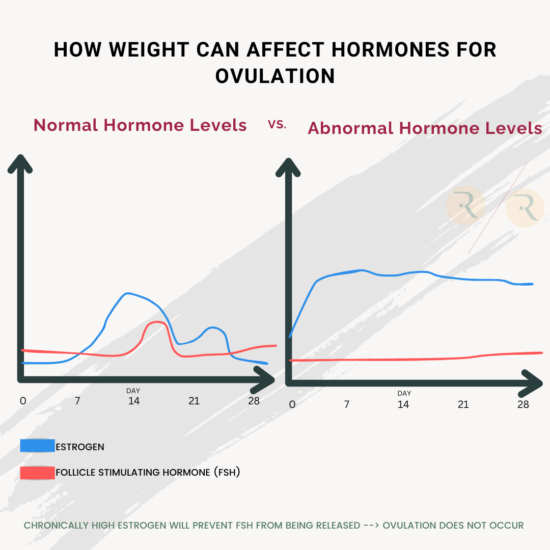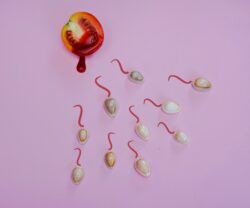Unlocking Fertility: The Impact of the Keto Diet on Egg Freezing
For many clients, the quest for the optimal diet for egg freezing and overall fertility is characterized by a desire for simplicity. Could the solution lie in adopting a keto diet?
Unfortunately, the answer isn’t as straightforward as one might hope. This page is dedicated to providing clarity for women like you, assisting in making informed decisions regarding whether the ketogenic diet aligns with your specific health objectives and circumstances. We’ll delve into what the ketogenic diet entails, its potential benefits, and the crucial precautions and strategies to ensure a balanced and sustainable approach toward achieving egg-freezing and fertility goals.
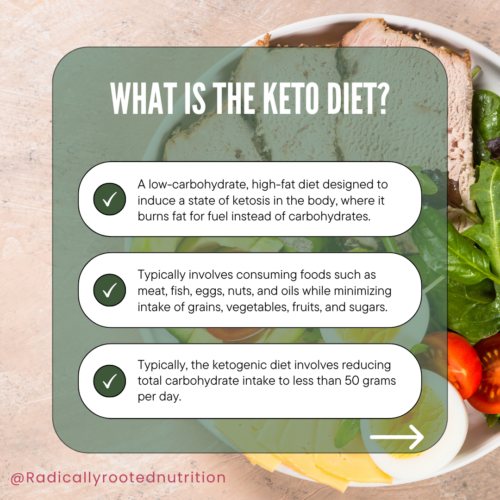
What is the Keto Diet?
In essence, the ketogenic diet revolves around a very low-carbohydrate and high-fat approach to eating.
Ordinarily, glucose derived from carbohydrates serves as the primary energy source for all cells in the body. The premise of the ketogenic diet lies in depriving the body of glucose, thereby prompting the production of an alternative fuel source from stored fat, known as ketones (hence “keto”-genic).
Carbohydrates are stored in the liver and muscles, serving as a reserve for energy. When carbohydrate intake is significantly reduced, the body initially accesses stored glucose from the liver and may even break down muscle tissue for energy. If this state persists for 3-4 days, depleting stored glucose, the body will shift to using fat as its primary fuel source.
There isn’t a one-size-fits-all “standard” ketogenic diet with a fixed ratio of macronutrients. Typically, the ketogenic diet involves reducing total carbohydrate intake to less than 50 grams per day, potentially dropping as low as 20 grams. To put this into perspective, a medium-sized bagel contains about 55 grams of carbohydrates. Generally, popular ketogenic resources advocate for an average of 70-80% of daily calories from fat, 5-10% from carbohydrates, and 10-20% from protein. For instance, on a 2000-calorie diet, this translates to approximately 165 grams of fat, 40 grams of carbohydrates, and 75 grams of protein per day. Most ketogenic plans allow for foods high in saturated fats like fatty meats, processed meats, lard, and butter, as well as sources of unsaturated fats such as nuts, seeds, avocados, plant oils, and oily fish. However, it’s important to note that ketogenic food lists may vary and sometimes even conflict depending on your information source.
Benefits of a Keto Diet for Fertility Outcomes
1- Insulin Resistance & Hormone Balance-
Research, particularly focusing on women with Polycystic Ovary Syndrome (PCOS), suggests potential benefits of the ketogenic diet on fertility outcomes. Insulin resistance, often associated with lower implantation rates in IVF transfer cycles, is critical to manage during egg freezing and IVF. The ketogenic diet has shown promise in improving insulin sensitivity, which can help regulate blood sugar levels and reduce insulin resistance. It is also associated with a decrease in the LH to FSH ratio, serum-free testosterone and an increase in sex hormone-binding globulin (SHBG).
A 2023 study on patients with PCOS and insulin resistance who adhered to a well-controlled ketogenic diet (with 50g total carbohydrates/1800 calories/day) reported improved fertility outcomes during IVF treatment. The reduction in carbohydrate intake led to weight loss and enhanced insulin sensitivity, contributing to improved fertility outcomes.
A systematic review and meta-analysis encompassing 7 clinical trials with 170 participants, focusing on the effects of a ketogenic diet on women with PCOS, highlighted significant improvements in reproductive hormone levels following a 45-day intervention with a ketogenic diet. These improvements included a reduced LH/FSH ratio, decreased serum-free testosterone, and increased serum SHBG, potentially influencing overall reproductive outcomes.
How Weight Affects Fertility in Women Does body weight impact the ability of women to get pregnant? Great question. According […]
2- Weight Loss
There is no question that the keto diet can promote rapid weight loss. Body weight and hormonal balance are intertwined factors that can impact fertility. Overweight or obese women often exhibit hormone imbalances, which could contribute to reduced fertility.
Weight loss induced by the ketogenic diet may positively influence fertility by improving hormonal balance, ovulation, and reducing insulin resistance, factors commonly associated with improved fertility outcomes.
3- Anti-inflammatory
Chronic inflammation significantly impacts reproductive health, often leading to suboptimal fertility outcomes, a phenomenon known as “inflammatory infertility.” The ketogenic diet’s anti-inflammatory properties offer the potential to alleviate this inflammation, thereby potentially bolstering fertility. Prolonged inflammation can detrimentally affect fertility by causing harm to cells and tissues within reproductive organs, such as eggs, ovaries, or sperm. Elevated glucose levels correlate with heightened inflammation markers, thus, adopting a ketogenic diet, which restricts carbohydrates and consequently lowers glucose levels, may amplify its anti-inflammatory benefits. The anti-inflammatory effects of the keto diet are proposed to be mediated through multiple mechanisms, including ketone body production, reduced glucose/insulin levels, and increased glucagon levels.
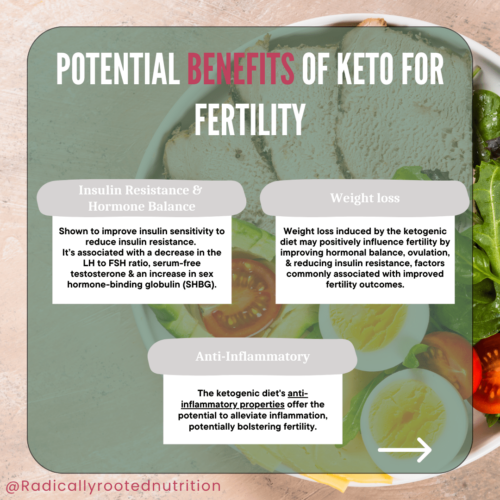
Why a Keto is NOT recommended for Egg Freezing and Fertility
Despite the numerous studies outlining successful fertility outcomes in women following a ketogenic diet, it’s crucial to acknowledge the associated risks and to consider the alternative dietary approaches available.
During when it comes to egg health and fertility, adequate nutrition plays a pivotal role. A nutrient-dense diet plays a crucial role in fertility as it provides the body with essential vitamins, minerals, and antioxidants necessary for reproductive health. Nutrients like folate, iron, omega-3 fatty acids, and antioxidants support hormonal balance, egg quality, and sperm health. When it comes to the keto diet, it is quite restrictive which can be detrimental to fertility outcomes. By eliminating approximately 60% of typical food choices, the keto diet leads to a deficiency in essential nutrients. The absence of carbohydrates translates to a lack of fiber and vital nutrients found in vegetables, which are crucial for not only fertility but our digestive health, weight management and stabilizing blood sugar levels. Not to mention, emerging research suggests the gut microbiome influences fertility by regulating hormone levels and immune function, and a varied diet rich in fiber, probiotics, and prebiotics fosters a diverse, healthy gut microbiome.
Moreover, not all fats are equal. While the keto diet emphasizes high fat intake and low carbohydrate intake, individuals may opt for fats from sources high in saturated fat like packaged keto products, bacon, cheese, sausages, heavy cream, and butter. Consuming a diet rich in saturated fats, exceeding the recommended daily intake of >10% of total calories per day, can elevate LDL (bad) cholesterol levels and potentially contribute to heart disease. Additionally, a high-fat diet can strain the digestive system, leading to chronic fatigue due to difficulties in metabolizing and breaking down fats.
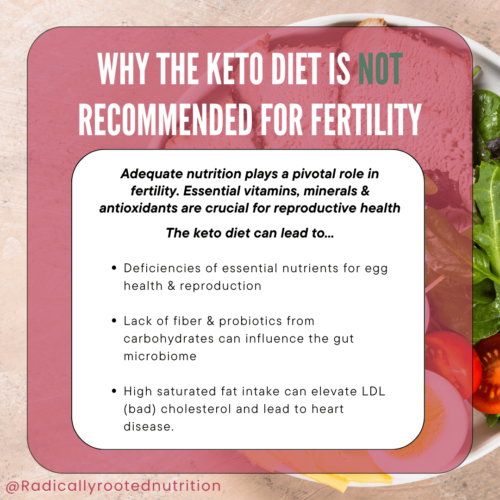
What to Eat for Egg Freezing and Fertility
Contrary to the ketogenic diet, a diet rich in nutrients, low glycemic, and anti-inflammatory is deemed optimal for fostering fertility and facilitating a successful egg-freezing procedure. Among various dietary patterns, the Mediterranean diet stands out with substantial evidence supporting its efficacy in promoting fertility, even among women with secondary conditions such as PCOS and obesity. While prioritizing the inclusion of protein and healthy fats while eliminating processed carbohydrates and added sugars is crucial, it’s equally vital to maintain balance by incorporating nutritious fruits, starchy vegetables, legumes, and whole grains. These wholesome carbohydrates offer essential micronutrients that naturally enhance fertility.
Navigating Your Egg Freezing and Fertility Journey
As you embark on your fertility journey, informed decision-making is key. Meeting with healthcare professionals, including fertility specialists and a Radically Rooted Dietitian, can provide personalized guidance tailored to your unique needs and circumstances. Together, you can explore dietary options, address concerns, and develop a holistic plan to support your fertility goals.
In conclusion, while the ketogenic diet may hold promise in certain contexts, it’s essential to approach its adoption with careful consideration. By prioritizing a balanced, nutrient-rich diet and leveraging expert guidance, you can navigate your fertility journey with confidence and clarity.
